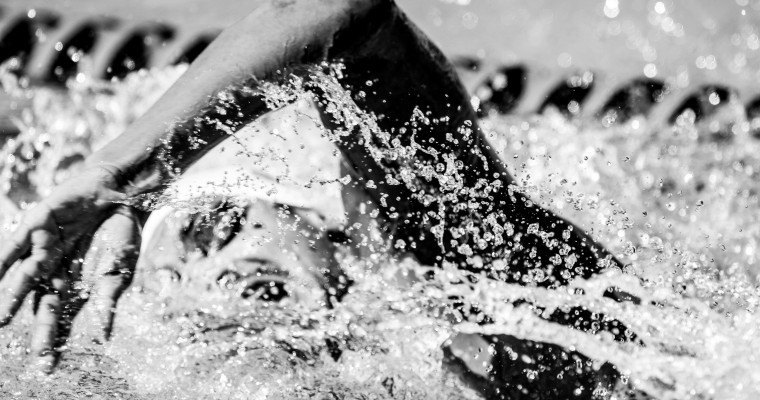Coaches play a huge role in a swimmer’s career. From their first strokes to their first big meet, coaches are always there beside their athletes. Many athletes see the great things their coaches do for them, but I’ve run into some who say they hate their swim coach. A strong coach-to-athlete relationship will make you the best you could possibly be. For those of you who don’t get along with your coach, or just want to strengthen your relationship, here are 5 tips for a great coach-to-athlete relationship:
1. Discipline
The “just do it” kind of attitude. When your coach tells to fix your catch or to try the harder interval, don’t argue with him. Talking back and purposely disobeying your coach is one of the best ways to create a negative atmosphere. Don’t whine, don’t complain, and put on a Nike t-shirt if it helps.
2. Listening Skills
“Well back in my days…” Yeah, we all know that coach, the one who talks about the swagger training he did when he was your age. But, hey, you never know, if you opened your ears to his Stone Age Training speeches you might actually get something out of it. Listening skills do go for both you and your coach. If you need to talk to him about something, he should always have his ears open as well.
3. Goals
What’s the point if you have no point? Sit down and have a talk with your coach if you seriously have no idea what your goals are. As you talk to him or her about your goals, ask your coach what his goals for you are. Are your goals too high or too low? Also, as the swimmer, what goals do you have for your coach? Maybe you want him to notice technique flaws more so that they can be fixed. Whatever it is, be sure you always have goal in mind.
4. Positivity
No swimmer or coach wants to dwell in a negative training environment. Athletes should always have a positive attitude toward their coaches, and coaches must work their best to create a positive atmosphere for all athletes. In the event that you feel negatively about something (sets, practice schedule, expectations, etc) work it out with your coach. Don’t allow something small to cause a dramatic scene. Oh, and remember to smile at each other. I know firsthand that this small thing helps build a positive relationship (:
5. Trust
The MIP (most important part) of a good coach-to-athlete relationship. Without trust, all of the above wouldn’t matter. If you don’t trust your coach, no good relationship can exist. You have to trust that your coach knows what’s best for you so that you can be your very best. The relationship with my coach is based on trust. Before could listen and do what he told me to do, I had to trust him. Learning to trust your coach will make swimming a better experience for the both of you.
What do you think is important in a good coach- athlete relationship? Share your thoughts in the comments below.

Frozen
Great points… How do you handle a coach who plays favorites and seems overcommitted in other areas to the point they can’t attend certain meets, but they always make the big meets for a certain swimmer? If you are requiring your swimmers to be committed, then the coach should be too!
For my young age group swimmer, it’s all about feeling safe with that individual.
Sad! Especially when you were ignored from your swim coach for 3 whole months. An all negative environment where children are berated for poor performances! This should be in the coaches handbook!
I am a masters swimmer. We have a different swimmer/coach relationship with our coach as he is actually younger than all of us. But all of these points still apply to the old swimmers like us. Especially “trust” and “positivity”.
What do you do when coach focuses & talks/provides technical help to the faster members of the age group squad & not the less developed members who train just as hard?
Three things come to my mind immediately.
1) Watch more and look for instances where he or she talks to each swimmer. Have multiple specific examples in mind before bringing it up with that coach or any coach on staff. If you just say “Hey, I think the instruction you give to the top-tier kids is disproportionate to the less advanced group” and leave it at that, you will probably be written off as a crazy swim parent. If you can give examples, you gain a lot more credibility.
2) Try hard not to be accusatory or aggressive when explaining your concerns. It’s an inherently sensitive issue, chances are the coach will be a bit defensive no matter what you… Read more »
Although if I were to ascribe an order in which to take these steps, it would be 1, 3, 2 rather than the one I gave. I wasn’t thinking of it as a process when I wrote it.
I 2nd these suggestions. What one should NOT do is go up to the coach in the middle of practice and talk to him or her about your concerns about your child. What often also does not work very well is cornering the coach right after practice is done and wanting to have a 30 minute discussion with him or her. If you have a quick question, that’s fine. But if it’s a more in-depth conversation, then arrange an appointment for another date/time.
#6 – your parents/guardians need to leave the coaching to the coaches.
These are all valuable, and are also applicable to the coach not just the swimmer.